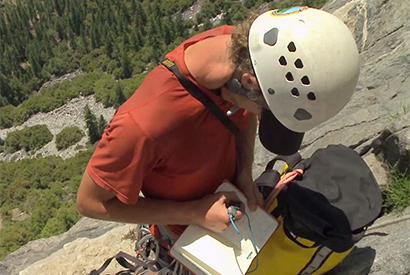Back to the future: Berkeley and the national parks start a second century of science
A conference focusing on the science emphasis of the National Park Service’s centennial will take place March 25-27 at UC Berkeley, exactly a century after an historic conference on campus paved the way for the birth of the NPS. The conference is called "Science for Parks, Parks for Science: The Next Century."

February 25, 2015
A conference focusing on the science emphasis of the National Park Service’s centennial will take place in late March at UC Berkeley, exactly a century after an historic conference on campus paved the way for the birth of the NPS.
The original conference at Berkeley, in 1915, brought together scientists, conservationists and park leaders to focus on the need for a federal agency to manage the parks science, stewardship and public engagement. The NPS came into being the next year. Pub

A rock-climbing researcher in Yosemite National Park.
At the centennial conference March 25-27, “Science for Parks, Parks for Science: The Next Century,” scholars, conservationists and public officials will again converge on campus. Their focus will be the critical scientific and social issues that affect the future of the parks, as well as the global reach of science in parks, such as understanding the impacts of climate change.
Harvard professor and two-time Pulitzer Prize–winner Edward O. Wilson will present the keynote address, “Setting Aside Half the World for the Rest of Life.” UC Berkeley, the NPS and the National Geographic Society are partners in putting on the conference, with sponsorship from KQED and Save the Redwoods. NPS Director Jonathan B. Jarvis and National Geographic Society Chief Content Officer Chris Johns will speak, and U.S. Secretary of the Interior Sally Jewell will appear on a public panel introduced by Berkeley Chancellor Nicholas Dirks.
“The national park system and public higher education are two of our country’s greatest inventions, and when we join together in a scientific alliance, the benefits to society are enormous,” Chancellor Dirks said. “This summit’s focus on the future is so important — not just for continued public engagement with the natural world, but also to understand the environmental changes unfolding around us so we can work to protect and preserve the planet.”
“As visionary leaders looked to establish the National Park Service, they met at Berkeley to consider what this organization had the potential to be,” NPS Director Jarvis said. “As we look forward to our second century of service and consider how national parks can connect with a new generation of Americans, it is only natural that we look to our colleagues at UC Berkeley to help us set a course for responsible stewardship that will support scientific research and benefit park visitors for the next 100 years.”
To read more, go to the College of Natural Resources website. For full information on the conference, visit the Science for Parks, Parks for Science website. A video about science in the parks can be viewed on both websites.